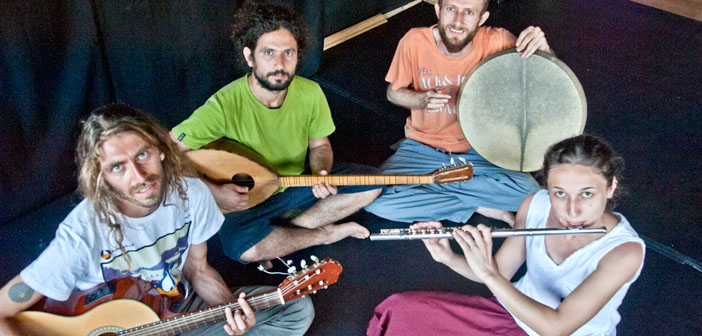‘Kürt halkı, müzikle birlikte yeni bir tarih yaratıyor’


Ferhad Feyssal, altıncı yüzyılda yaşamış Çinli düşünür Konfüçyüs’tan alıntı yaparak, “İnsanları gerçekten tanımak için onların müziğine bakmalısınız” diye mırıldanıyor. Konfüçyüs ayrıca, “Bir ülkenin iyi yönetilip yönetilmediğini, ahlaki değerlerinin iyi olup olmadığını anlamak için o ülkenin müziğini dinlemek yeterlidir,” diye eklemiş ki Danuk için de müzik, Kürt kültürünü yaymanın bir yolu.
Kobane kuşatması sırasında Avrupa’da artmaya başlayan, Kürtlere ve Kürt kültürüne yönelik ilgiden bahseden Ferhad’ın grup arkadaşı Fayysal Macit, insanların Kürt kültürüne dair yanlış kanılarına dikkat çekiyor. “Kürt halkı sadece karanlıktan doğan savaşçılardan ibaret değil. Tek meselemiz IŞİD değil,” diyor. “Günbegün değişiyoruz. Biz müzisyen ve sanatçıyız.”
Ferhad ayrıca meşhur YPG savaşçılarının her zaman bu konumda olmadığını da söylüyor: “Onlar da normal insanlardı ve sonra savaşa katılmak zorunda kaldılar.” Fayysal onun bu düşüncesini şöyle tamamlıyor: “Kürtler sadece karanlığın içinde savaşmıyor. Birçok aşk hikâyemiz, barışçıl hikâyelerimiz var.”
Barış aşkından doğan proje
Danuk projesi de tam olarak bu iki fikirle alakalı: Aşk ve barış veya daha ziyade barış aşkı. Grup 2015 yılının Mayıs ayında, genel seçimlerin arifesinde, İstanbul’da kurulmuş. Fayysal, “Müzik yapmaya başladığımızda savaş da başladı...” diyor. Kürtler ve Türkiye devleti arasındaki çatışmanın ortasında sokakta müzik yapmaya korkar olmuşlar ki bu Ferhad’ın ‘çok özlediği’ bir şeymiş. Zaten grup da sokakta müzik yaparken bir araya gelmiş.
“Sokaklarda çalmaya başladığımızda şarkılarımız halk müziği olduğundan herkes dinleyebilirdi,” diyor Ferhad. “Çünkü halk müziği yaparken, kültürünün ve halkının folklorunu ortaya koyarsın ama diğer insanlar da bu enerjiyi alarak, bu enerjiyi severek senin duygularını paylaşırlar.”
Grup üyelerinden Hozan Osman’la Suriye’nin Haseke şehrinde aynı mahallede büyüyen Ferhad, Fayysal’la başka bir Kürt topluluğuyla sokakta müzik yaparken tanışmış. “Başka Kürt müziği projelerim de var,” diyor Fayysal, “ama daha önce bu tür müzik yapmayı düşünüyordum.” Eskişehir, Antalya ve İstanbul’da dinleyici karşısına çıkmış olan Fayysal Kürtçe müzik yapmaya alışık ama bunu Türkçe sözlerle yapıyormuş.
“Şimdi durum farklı, çünkü Hozan ve Ferhat Rojavalı,” diyor Fayysal. “Rojavalı Kürtler, dilimizi daha iyi biliyorlar. Felsefi meseleler hakkında Kürtçe konuşabiliyorlar. Türkiye’de Kürtler olarak kendimizi Türkçe ifade ediyoruz.” Fayysal’a göre bu grup, onun Kürt müziği macerasında yeni bir sayfa olmuş: “Benim için en önemlisi bu. Birlikte çalışırken Kürtçe çalışıyoruz ve Kürt müziği yapıyoruz. Bu benim için çok büyük bir zevk.”
Yarı Türkiyeli yarı Suriyeli
Grubun farklı kökenlerine -yarı Türkiyeli yarı Suriyeli- rağmen tek dilde, Kürtçede, ve hepsinin yuvası bildiği Mezopotamya bölgesi boyunca uzanan Kürt kültüründe buluşmuşlar. Grubun adı, Hozan ve Ferhad’ın Haseke’de geçen çocukluklarından çok iyi bildiği bir Mezopotamya geleneğinden geliyor. Her kış arkadaşlar ve aileler bulgur yapmak için kullanılan ‘danuk’un etrafında toplanır, ateş yakar ve topluluğun yaşlı üyelerinden hikâyeler ve şarkılar dinlermiş. Danukun hazır olması için iki saat bekledikten sonra herkes aynı kaptan yemek yermiş.
Danuk grubunun üyeleri de Kürt kültürü ve müziğini aynı yöntemle kitlelere ulaştırmak istiyor. Farklı şehirlerden geliyor olsalar da çocukken aynı halk şarkılarını dinlemiş, kayıp aşklara veya Jazira (Yukarı Mezopotamya) toprakları için savaşan krallara dair aynı hikâyeleri duymuşlar. Ferhad gitar çalmaya 21 yaşında başlamışken, Hozan küçük yaşta kız kardeşleriyle birlikte bağlama (buzuq) çalmayı öğrenmiş ve Ferhad da benzer şekilde babasından def (erbane) çalmayı öğrenmiş. Gül Temiz ney ve zurnasıyla, Alessandro Tom ise davul ve vurmalı çalgılarla gruba eşlik ediyor.
Birlikte çaldıkları şarkılar kadim bir gelenekten gelse de oldukları şekilde kalmak istemiyorlar. Danuklarını diğer kültürler ve geleneklerle karıştırıp paylaşmak niyetindeler. Birçok Kürt müziği projesi, Ferhad’ın sayılarının 300’ü bulduğunu tahmin ettiği halk şarkılarını korumayı amaçlarken Danuk, ezgileri sentezlemek, bunları yeni müzik aletleriyle icra etmek ve diğer kültürlerin müzikleriyle denemeler yapmak istiyor. Ferhad değiştiremeyecekleri tek şeyin makam olduğunu söylüyor.
Hedef, sokaklar
Ferhad, içinde birçok şeyi barındıran Kürt müziği hayalinin, Danuk’un 24 saat içinde çektiği ilk tanıtım videosunu izlediğinde nihayet gerçekleştiğini hissetmiş. “Her yerde savaş var,” diyor, “Gitgide daha çok insan ve şarkı acılara ve olanlara ağlamaya odaklanıyor. Ama ağlayarak hiçbir şey değiştiremezsin.” Fakat grup, değişimin nasıl yaratılabileceği konusunda hemfikir: “Barışa dair bir fikrin olduğunda ve bu barışı sadece Kürtler, Türkler veya Araplarla değil, herkesle paylaşmayı istediğinde... Videomuzun son halini gördüğümde dedim ki evet, güzel şeyler yapabiliriz.”
Danuk, sadece İstanbul’da konser veriyor olmaktan memnun değil. Fayysal birkaç girişiminde Kürtlere yönelik önyargılar yüzünden bazı olaylar yaşadığından şimdilik sokaklarda müzik yapamayacaklarını düşünse de, konserlerle şehrin dışına çıkmak istiyor. Ferhad, “Türkiye’ye barış geldiğinde turneye çıkmak istiyoruz,” diyor. Hayalleri, Rojava’da ve tüm ülkede konserler vermek. Her konserlerinde müziklerinden oluşan sembolik bir danuk ve izleyicilerle paylaşmak için gerçek bir danuk olsun istiyorlar.
Savaş ve barıştan bunca bahsetmelerine rağmen grup üyeleri Danuk’u siyasi bir proje olarak görmüyor. Aslında siyasetten uzak durmak ve ister Sırbistan, ister İspanya, ister de Suriye’den olsun başka sanatçılarla müzik yaparak yakınlaşmak istiyorlar. Çatışma dönemlerinde Danuk’un çaldığı türden geleneksel şarkılar yankı uyandırıyor. “Ayrıca tarihle ilgili melankolik müziklerimiz de var. Kürdistan her zaman saldırı altındaydı,” diyor Fayysal, Hozan bir yandan bağlama çalarken. “Artık özgürlük istiyoruz. Müzik de siyasi bir olgu ve durmadan değişiyor. Kürt halkı müzikle birlikte yeni bir tarih yaratıyor.”


